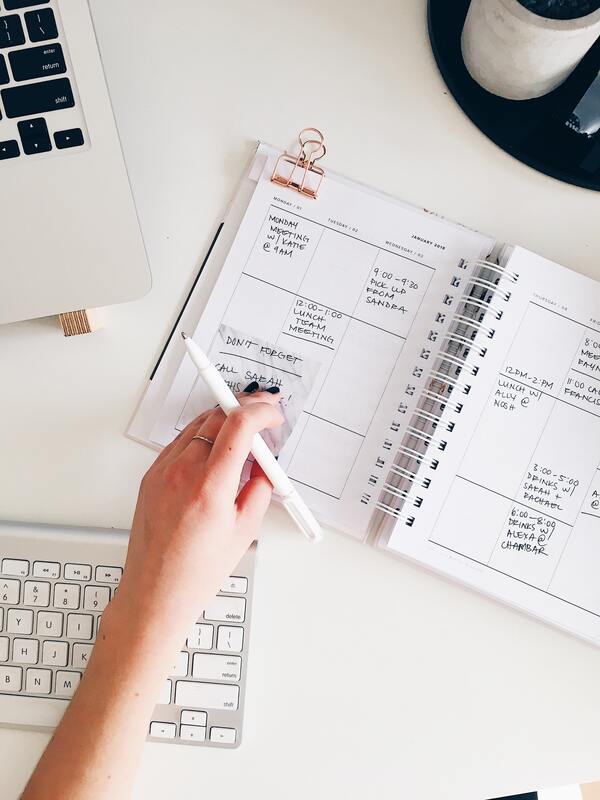|
Discover ideas and tips to plan your week effectively. Have you ever spent part of your Sunday dreading the week ahead? Thinking about everything you need to do in the next few days might stress you out, especially if you’ve just finished a whirlwind week that was neither efficient nor productive. Maneuvering between tasks throughout a week without a clear plan might feel like navigating through a choppy ocean on a cloudy night without a compass. This is where weekly planning comes into play. It allows you to set attainable goals and figure out how to spend your week. Weekly planning is the act of writing down your activities, tasks, and events for the entire week. Even if organizing your weekly tasks seems inconsequential at first, dividing your time wisely throughout the week may help you better control your life and reduce your stress levels. Moreover, writing down your short-term goals and everything you want to accomplish for the next few days gives you a chance to achieve your personal and professional pursuits and maintain a work-life balance. Although weekly planning is like daily planning, a weekly plan isn’t the more extended version of a daily agenda. Whereas daily plans typically include specific time slots allocated for each task and activity, most weekly plans focus on setting and accomplishing short-term goals. Therefore, weekly planning can help you achieve your long-term goals by conquering their short-term components. Let’s discuss some ideas for fail-proof weekly planning. Planning Your GoalsMany people have goals they would like to accomplish someday, such as learning a new language, eating healthily, or reading more books. Often, these long-term goals are postponed and sometimes abandoned. One way to ensure reaching your long-term goals is to break them down into smaller weekly goals. You can set multiple goals per week, as long as they are attainable, and you aren’t overbooking yourself. When your weekly goals are achievable, every week will bring you one step closer to your larger life goals. Planning Your ExerciseThe World Health Organization (WHO) recommends a minimum of 150 minutes of moderate or 75 minutes of vigorous aerobic activity per week for adults (WHO, 2010). Moreover, having clear short-term fitness goals can keep you on track, as demonstrated in a study with runners that weekly goal setting was associated with increased running distance (Wack, Crosland & Miltenberger, 2014). When designing and incorporating your exercise plan, you might want to consider factors such as your fitness goals, age, body composition, general fitness level, and whether you already have an exercise routine. For instance, if you are generally in good health but don’t have an established exercise routine, try choosing relatively easy workouts first and progress slowly. If you have any existing health conditions, consider talking to a health care professional before creating an exercise routine. Planning Your Mental WellnessUnfortunately, mental well-being goals don’t always get the attention they deserve. There are, however, several easy mental health activities that you can embed into your weekly routine. Here are some practical mental well-being activities you can try. Deep BreathingYou can’t avoid stressful situations indefinitely, and stress-inducing tasks might make regular appearances in your weekly routine. Taking deep breaths during stressful periods can slow down your heart rate and help you calm down (Van Diest et al., 2014). So try incorporating reminders into your plan to practice deep breathing before stressful activities, such as an important meeting with a client or a midterm exam. MindfulnessMindfulness is being aware of your experiences without passing judgments. Practicing mindfulness allows you to pay attention to your thoughts, sensations, and emotions. Being aware of what you think, and feel can allow you to accept your thoughts and feelings and achieve an optimal mental balance. Although mindfulness is often incorporated into activities such as yoga and meditation, you can practice mindfulness anytime, anywhere. Relaxing ActivitiesYou might want to reserve some time each week for relaxing activities that will help you feel happier. These activities can be practicing yoga, tai chi, meditation, or running. Others might prefer spending time in nature or losing themselves in a hobby. Others feel happy and energized when they socialize with friends. Whatever your relaxing activities are, regularly engaging in them might help you feel joyful and give you a positive outlook. References
Comments are closed.
|
AuthorPamela (Pami) Parker currently serves as a holistic practitioner, coach and teacher. Her intention is to be a compassionate guide to those who choose to experience a healthier, happier and more peaceful way of life. Categories
All
|
Company Details
The Self-Care Cafe is a member of The Conscious Center
Dutch Chamber of Commerce (KvK) Registration #64532593
Taxation (VAT) Number: NL670496157B01
Privacy Policy
The Self-Care Cafe is a member of The Conscious Center
Dutch Chamber of Commerce (KvK) Registration #64532593
Taxation (VAT) Number: NL670496157B01
Privacy Policy

